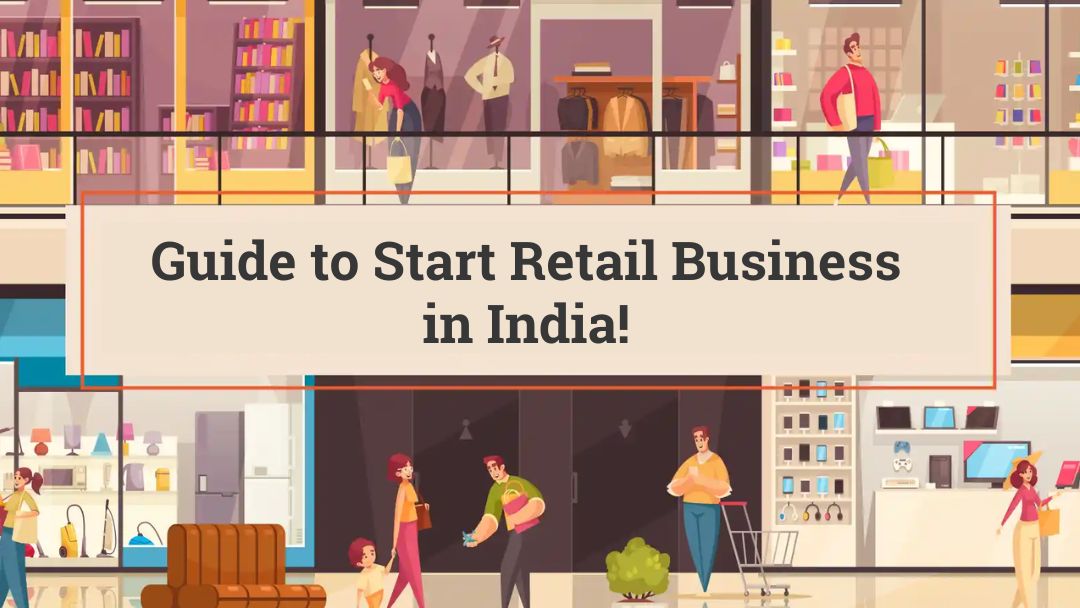Are you wondering to start a retail business in India? Well, starting a retail business in India involves several steps. Here is a guide to help you get started:
Research and Select a Niche: Identify the market demand and choose a specific retail niche you want to enter. Consider factors such as target audience, location, competition, and profitability.
Business Plan: Develop a comprehensive business plan that includes your goals, budget, marketing strategy, target audience, and financial projections. It will serve as a blueprint for your business and help you obtain funding if required.
Choose a Legal Structure: Decide on the legal structure of your retail business, such as sole proprietorship, partnership, or private limited company. Consult a lawyer or chartered accountant to understand the legal requirements and tax implications.
Register Your Business: Register your business legally by obtaining the necessary licences and permits. These may include GST registration, trade licence, Shops and Establishments Act registration, and more. You will also need to open a business bank account.
Location: Find a suitable location for your retail store considering factors like footfall, accessibility, competition, and rental costs. Negotiate a lease or purchase agreement and ensure the space meets your requirements.
Source Suppliers: Establish relationships with reliable suppliers and wholesalers for the products you intend to sell. Negotiate terms, prices, and delivery schedules. It’s important to maintain a good supply chain to keep your inventory stocked.
Set Up Your Store: Design and set up an attractive and functional store layout. Consider aspects such as shelving, lighting, signage, and checkout counters. Install security measures like surveillance cameras and alarm systems.
Hire and Train Staff: Determine the number of employees required for your store and hire trained and experienced staff. Provide them with proper training on customer service, sales techniques, and product knowledge.
Marketing and Promotion: Develop a marketing strategy to reach your target audience and build brand awareness. Utilize online platforms, social media, local advertising, and traditional marketing techniques to promote your store. Offer attractive discounts, loyalty programs, or special events to attract customers.
Inventory Management: Implement effective inventory management systems to track and manage your stock. Ensure you have optimal levels of inventory to meet customer demand while minimizing losses from overstocking or out of stock situations.
Provide Excellent Customer Support: Aim to provide exceptional customer service in order to build a loyal customer base. Train your staff to handle customer inquiries, complaints, and provide assistance when required.
Remember to comply with all legal requirements, taxation regulations, and stay updated with any changes in the retail industry. Seek professional advice when necessary to ensure a smooth start for your retail business in India.
Types of Retail Business
1. Department Stores: Large stores that sell a wide range of products, including clothing, accessories, home goods, electronics, and more.
2. Specialty Stores: Small stores that focus on one specific product category or niche, such as shoes, books, toys, or sporting goods.
3. Discount Stores: Stores that offer products at lower prices than traditional retail stores, often selling items in bulk or offering frequent promotions and discounts.
4. Convenience Stores: Small stores that sell a limited selection of everyday items such as snacks, beverages, toiletries, and basic household products.
5. Supermarkets: Large stores that sell a wide range of groceries, including fresh produce, meat, dairy products, canned goods, and other household necessities.
6. Online Retailers: Retailers that operate primarily or exclusively online, selling products through a website or mobile app and delivering them directly to customers’ homes.
7. Specialty Food Stores: Stores that specialize in selling gourmet or specialty foods, such as artisanal cheeses, organic produce, specialty spices, or international ingredients.
8. Drugstores: Stores that primarily sell pharmaceutical and health-related products, including prescription medications, over-the-counter drugs, personal care items, and beauty products.
9. Outlet Stores: Stores that sell discounted products from a specific brand or retailer, often selling excess inventory or previous seasons’ items at a reduced price.
10. Franchise Stores: Retail stores that operate under a franchise agreement with a larger parent company, allowing them to use the parent company’s branding, products, and business model.
What are the Advantages of Starting a Retail Business in India?
Large Consumer Base: With a population of over 1.3 billion people, India offers a massive consumer market for retail businesses. The growing middle-class population with higher disposable incomes presents huge opportunities for retailers to tap into.
Growing Economy: India being one of the fastest-growing economies in the world, The increasing purchasing power and changing consumer preferences create a favourable environment for retailers to thrive.
Diverse Retail Sectors: India has a diverse retail industry with various sectors, including clothing, electronics, luxury goods, and food and beverages. This allows retailers to choose from a wide range of sectors based on their interests and expertise.
E-Commerce Growth: India has witnessed significant growth in the e-commerce sector, offering a new avenue for retail businesses. The rise of internet penetration and smartphone usage has fueled the growth of online retail, providing retailers with additional channels to reach customers.
Government Support: The government of India has implemented various policies and initiatives to support the growth of the retail sector. These include initiatives like ‘Make in India,’ which encourages manufacturing within the country, and ‘Digital India,’ which promotes digitalization and e-commerce.
Lower Overhead Costs: The cost of setting up and running a retail business in India is relatively lower compared to other countries. Rent, labor, and operational costs are comparatively cheaper, allowing retailers to have higher profit margins.
Local Sourcing Advantage: India is known for its robust manufacturing and sourcing capabilities. This provides retail businesses with access to a wide range of products at competitive prices, giving them a competitive edge in the market.
Cultural Diversity: India boasts a rich cultural heritage, and each region has its unique preferences and shopping habits. Retailers can tailor their offerings to cater to the diverse tastes and preferences of different regions, allowing for targeted marketing strategies.
Franchise Opportunities: India has a thriving franchise industry, offering opportunities for international retail brands to enter the market through franchise partnerships. This allows retail businesses to leverage an already established brand and business model.
Infrastructure Development: India has been witnessing significant infrastructure development, including the expansion of transport networks and the development of modern retail spaces. This further facilitates the growth of the retail sector by providing better logistics and shopping experiences for consumers.
Things to Consider for Starting a Retail Business in India
Barcodes are important for several reasons:
1. Market Research: Conduct thorough market research to understand the demand, competition, and target audience for your retail business. This will help you identify the right product or service to sell and determine the best location for your store.
2. Legal Requirements: Familiarise yourself with the legal requirements and licence necessary to start a retail business in India. This may include registering your business, acquiring the appropriate permits, and complying with tax obligations.
3. Target Audience: Define your target audience and tailor your products or services accordingly. Consider factors like demographics, purchasing power, and preferences to understand what will sell well in your chosen market.
4. Location: Choose a strategic location for your retail store. Take into account factors such as foot traffic, accessibility, proximity to competitors, and target audience preferences.
5. Suppliers: Establish reliable and cost-effective suppliers for your products. Choose suppliers who can offer competitive prices, good quality, and consistent availability.
6. Pricing Strategy: Develop a pricing strategy that ensures profitability while remaining competitive in the market. Consider factors like pricing of competitors, demand for the product, and operational costs.
7. Staffing: Determine the staffing requirements for your retail business. Hire employees with relevant skills and experience, and ensure they are adequately trained to provide excellent customer service.
8. Store Design and Layout: Create an attractive store design and layout that is appealing to your target audience. Consider factors such as product visibility, ease of movement, and creating a welcoming and friendly atmosphere.
9. Inventory Management: Implement effective inventory management systems to ensure sufficient stock is available without excessive overstocking or understocking. Use technology such as POS systems to track and manage inventory efficiently.
10. Marketing and Promotion: Develop a comprehensive marketing and promotion strategy to create awareness and attract customers to your retail business. Utilise both online and offline channels, such as social media, advertising, PR, and special events.
11. Customer Experience: Focus on providing an exceptional customer experience to build customer loyalty and word-of-mouth referrals. This may include personalised service, easy returns and exchanges, loyalty programs, and a user-friendly shopping environment.
12. Financial Planning: Develop a sound financial plan that includes startup costs, ongoing expenses, and projected revenue. Seek advice from financial experts, and secure adequate funding or investment if necessary.
13. Compliance with Regulations: Ensure that your retail business complies with all applicable laws and regulations, such as labour laws, health and safety regulations, and consumer protection laws.
14. Technology Integration: Embrace technology to enhance operational efficiency and improve customer experience. Consider implementing point-of-sale (POS) systems, online selling platforms, and inventory management software.
15. Adaptability: Stay abreast of market trends, consumer behavior, and technological advancements. Continuously evaluate and adapt your retail business to stay competitive and meet evolving customer demands.
Is Registration Required for a Retail Business?
Yes, registration is typically required for a retail business. The specific registration requirements may vary depending on the jurisdiction and type of business, but generally, a retail business would need to register for a business licence or permit with the local government or relevant authority. This registration process may involve filling out an application, providing necessary documentation, paying any applicable fees, and adhering to any specific regulations or guidelines for retail businesses in that jurisdiction. It is important to consult with local authorities or a professional advisor to ensure compliance with all registration and licensing requirements.
Summing Up:
The retail sector in India has experienced significant growth over the years, driven by changing consumer preferences and increasing disposable incomes. The market is highly competitive, with both domestic and international players trying to capture a share of the growing consumer demand.
To succeed in the Indian retail market, retailers need to understand the diverse consumer preferences, adapt to local tastes, and invest in localization strategies. Offering a wide range of products, maintaining competitive pricing, and providing superior customer service is key for success.
Overall, the retail sector in India is poised for continued growth, driven by increased consumer spending, urbanisation, and digital adoption. However, retailers need to devise strategies that address the unique challenges of the Indian market to thrive in this competitive industry.

